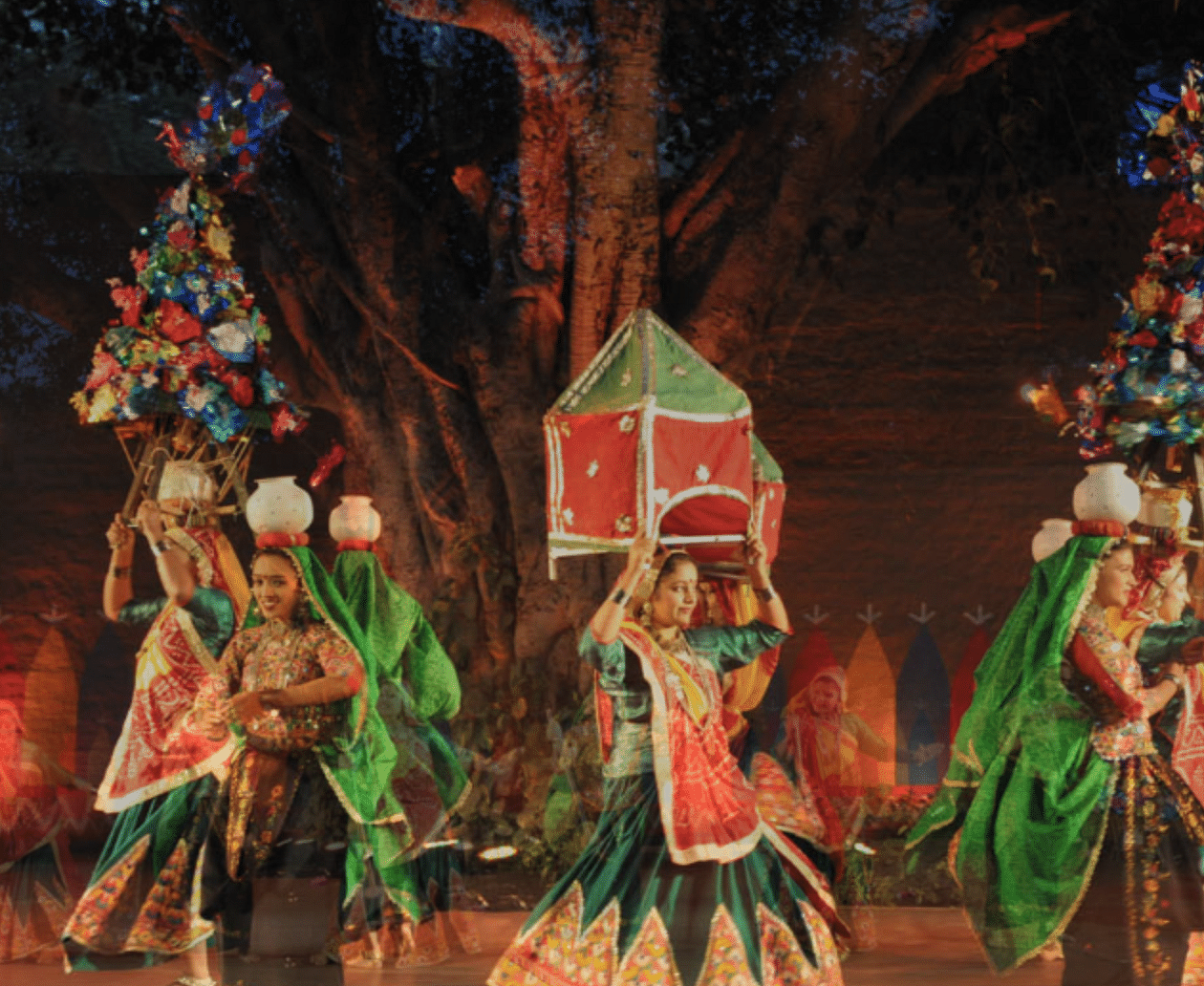Culture
Sorry, Kalidasa – This Is Lutyens’ Delhi
- The Meghdoot Theatre Complex at Rabindra Bhavan, New Delhi, will be renamed as Alkazi Rangapeeth, on 3 May, in a “dedication ceremony” meant to honour renowned theatre director Ebrahim Alkazi.
- What is the logic behind renaming a stage with an unmistakable reference to Kalidasa?

Artists perform garba raas during Pratha Parv. (Sangeet Natak Akademi)
The Sangeet Natak Academy, located in Rabindra Bhavan, New Delhi, is scheduled to conduct a “dedication ceremony of Meghdoot Theatre Complex as Alkazi Rangapeeth”, on 3 May 2017. For those who have seen this open air theatre located in Rabindra Bhawan called Meghdoot Theatre as its only and vintage performing space, to comprehend this ‘dedication’, or to bluntly call it renaming of the Meghdoot Theatre, needs a great flight of imagination.
What exactly is being done? This naamakarana is being conducted in the Rabindra Bhawan that houses the three ace academies – Lalit, Sahitya and Sangeet Natak.
The question that arises is plain and simple. What is the logic behind renaming a stage named with an unmistakable reference to Kalidasa in the memory of a modern stage director and teacher Ebrahim Alkazi?
Meghdoot Theatre is the only, I repeat, the only mark in Delhi, that reminds us of Kalidasa, one of the greatest poets of India. (Yes, there is a road, a kilometre long, from Anand Parbat to Shakti Nagar, which is partly called Kalidasa Marg – a road where you see only cars and buses. What was the logic behind this perfunctory naming?)
And now, the Meghdoot Theatre, where so many good performances of all kinds are held, will be named after Alkazi. I want to question this setting up of Alkazi against Kalidasa. Why is it being done? What are the intentions behind it? Is there a debate being generated to assert the modernity as an arbitrator on classical India? Is India (and its history) so small that modernity has to be recognised and its existence affirmed by constantly pushing out the ancient and particularly the classical? I know that it is a game been played for 70 years, and has landed India, now with nothing more than a 'Bollydelicous' identity – to make a living out of which is the main aspiration of most National School of Drama (NSD) graduates.
I have all the respect for Alkazi, his contribution to Indian theatre, and his work as a founding director of the NSD, and I do not need non-Delhites to remind me of his contributions. I have seen the area, from Bengali Market to Lodhi Road, develop as a cultural space, brick by brick, and great men and women perspire there for the last 55 years.
The NSD was once located in Rabindra Bhawan, but has long shifted to Bahawalpur House. All other organisations, like Centre for Cultural Resources and Training, Kathak Kendra and American Library were vacated for it, and it is now, more or less, the holder of the entire campus. Why not call that house Alkazi Rangasthala? Why not call Abhimanch, the main auditorium of NSD, as Alkazi Rangashaala? Will that not be a more fruitful and a complete honour to Alkazi? Instead of establishing the revered guru in his home, the NSD campus, why encroach upon a space sanctified for Kalidasa?
There is a story doing the rounds, that Alkazi and some of his dear students, with their bare hands, constructed the Meghdoot Theatre. Admirable indeed, but it gives them, or some great well wisher of theirs, a right push over Kalidasa, is beyond me (am more in the company of dasas than maharathis).
There is something much more entertaining and astonishing that I am being told. It is that Meghdoot Theatre will always be called Meghdoot Theatre, but will be rededicated as Alkazi Rangapeetha. Grammatically, ranga (theatre) peetha (stage) means performing space. How the two shall coexist, and demarcate different spaces, is sheer mysticism. I have only one guess: when lectures are held on Indian theatre in the memory of Alkazi, the place shall become a Rangapeetha (a chair of theatre studies), but when performances are held, we shall allow the poor dasa to have his name.
The whole space which contains Meghdoot Theatre, and smaller Meghdoot I, 2 and 3, will be called Alkazi Rangapeeth. So, a space or a complex will be called peetha. The academy lacks a dictionary!
There is nothing surprising or new in what is going on at Rabindra Bhawan. The whole enterprise is typical of India’s truncated modernity which marginalises the ancient to assert its superiority.
Bharat Gupt is trustee and executive member, Indira Gandhi National Centre for the Arts, New Delhi.
Introducing ElectionsHQ + 50 Ground Reports Project
The 2024 elections might seem easy to guess, but there are some important questions that shouldn't be missed.
Do freebies still sway voters? Do people prioritise infrastructure when voting? How will Punjab vote?
The answers to these questions provide great insights into where we, as a country, are headed in the years to come.
Swarajya is starting a project with an aim to do 50 solid ground stories and a smart commentary service on WhatsApp, a one-of-a-kind. We'd love your support during this election season.
Click below to contribute.
Latest